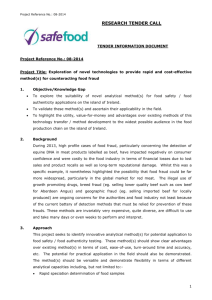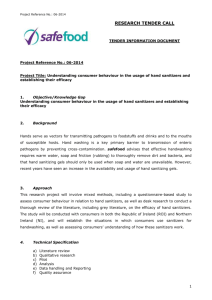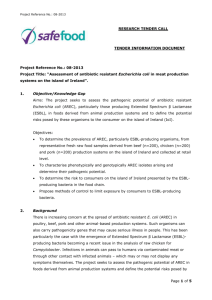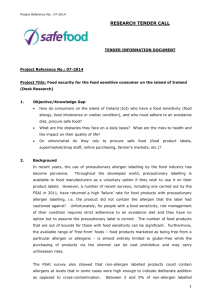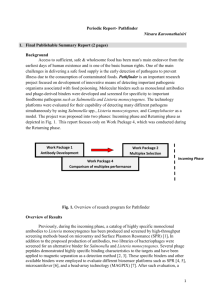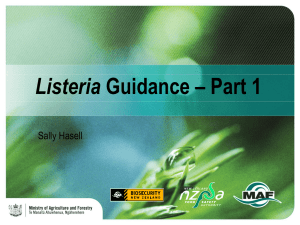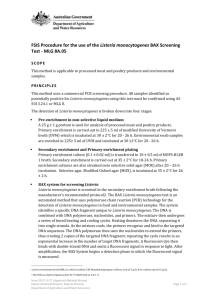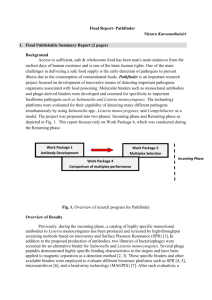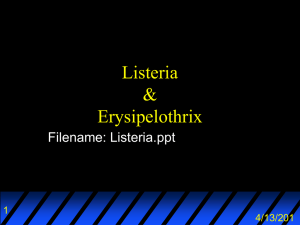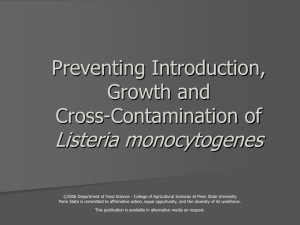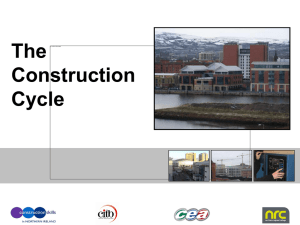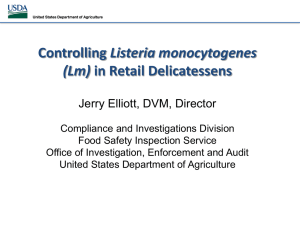Risk profiling Listeria in ready-to eat foods (RTE) and
advertisement
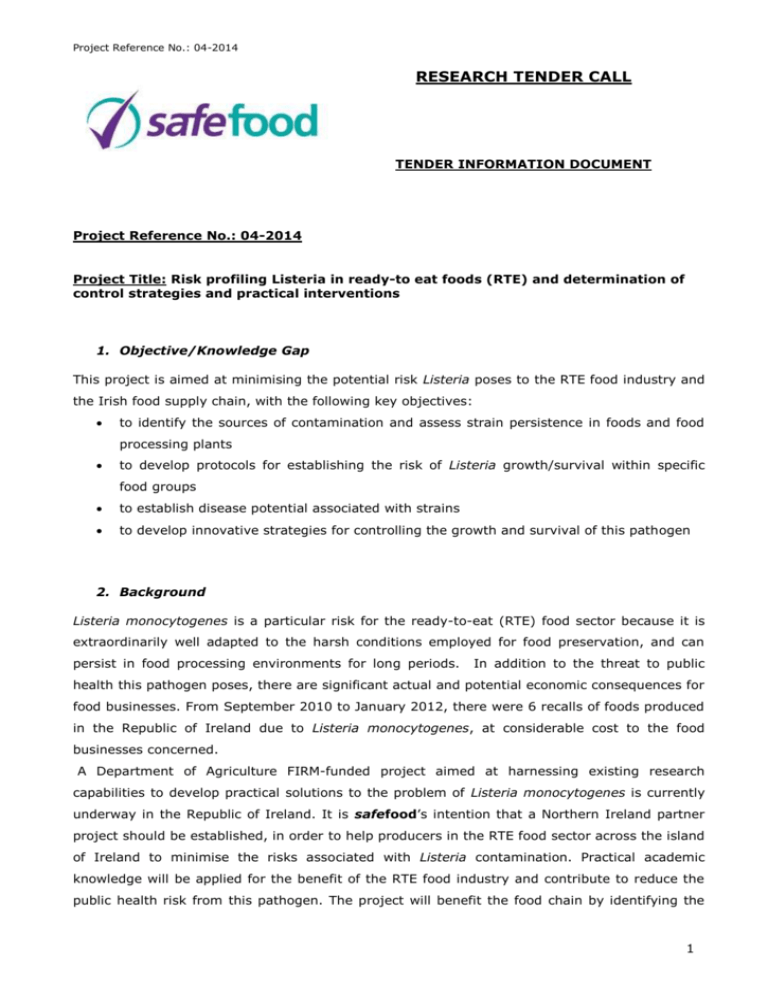
Project Reference No.: 04-2014 RESEARCH TENDER CALL TENDER INFORMATION DOCUMENT Project Reference No.: 04-2014 Project Title: Risk profiling Listeria in ready-to eat foods (RTE) and determination of control strategies and practical interventions 1. Objective/Knowledge Gap This project is aimed at minimising the potential risk Listeria poses to the RTE food industry and the Irish food supply chain, with the following key objectives: to identify the sources of contamination and assess strain persistence in foods and food processing plants to develop protocols for establishing the risk of Listeria growth/survival within specific food groups to establish disease potential associated with strains to develop innovative strategies for controlling the growth and survival of this pathogen 2. Background Listeria monocytogenes is a particular risk for the ready-to-eat (RTE) food sector because it is extraordinarily well adapted to the harsh conditions employed for food preservation, and can persist in food processing environments for long periods. In addition to the threat to public health this pathogen poses, there are significant actual and potential economic consequences for food businesses. From September 2010 to January 2012, there were 6 recalls of foods produced in the Republic of Ireland due to Listeria monocytogenes, at considerable cost to the food businesses concerned. A Department of Agriculture FIRM-funded project aimed at harnessing existing research capabilities to develop practical solutions to the problem of Listeria monocytogenes is currently underway in the Republic of Ireland. It is safefood’s intention that a Northern Ireland partner project should be established, in order to help producers in the RTE food sector across the island of Ireland to minimise the risks associated with Listeria contamination. Practical academic knowledge will be applied for the benefit of the RTE food industry and contribute to reduce the public health risk from this pathogen. The project will benefit the food chain by identifying the 1 Project Reference No.: 04-2014 source(s) of contamination, developing strategies to control contamination and practical interventions and by enabling knowledge transfer relating to L. monocytogenes. 3. Approach The research will be focussed on four main themes, aligned with the objective outlined above: 1. Source/persistence 2. Growth 3. Disease potential 4 Control Food and environmental samples will be taken from 30 selected food processing facilities across Northern Ireland and sent to the participating laboratory for analysis. The sampling will be carried out by the food business operators themselves, under guidance from the laboratory. This element of the study will help to identify the source/persistence of L. monocytogenes within the food businesses and provide isolates for physiological and molecular studies. These studies (including genome sequencing) will give insights into the causes of persistence in the processing environment, growth in foods and the disease potential of the isolates. Additionally, these isolates will be used in studies to develop control strategies, thus helping to alleviate the burden that L. monocytogenes places on the food industry on the island of Ireland, and protecting public health. The results will be disseminated through the already established safefood Listeria Network, targeted workshops aimed at up skilling (Food Business Operators, regulators, vets, etc.), as well as reports and publications. 4. Technical Specification (a) Literature review (b) Data collection (c) Sample analysis and laboratory studies (d) Data analysis (e) Data handling & reporting (f) Quality assurance (a) Literature review: A full and thorough review of the literature around Listeria monocytogenes in the food processing environment, and existing control strategies. It should include peer-reviewed publications and also a full search of the grey literature including government and other organisation reports, and conference proceedings etc. 2 Project Reference No.: 04-2014 (b) Data collection The contractor will recruit 30 food processors in Northern Ireland, from a range of sectors, including the dairy, meat, fisheries and fruit & vegetable sector. The contractor will be responsible for training the food business operators in the correct methodology for sampling for Listeria monocytogenes. The contractor will ensure that 6 environmental samples are taken from each premises on a bi-monthly basis for the duration of the project. These samples must be transported to an accredited laboratory under controlled conditions, where analysis should begin within 24hours. The sampling methodology and sampling plan must be approved by safefood in advance of the survey (c) Sample analysis & Laboratory Studies The samples will be analysed for the presence of Listeria monocytogenes, using appropriate methods. The resulting isolates will be used in physiological and molecular studies, designed to ascertain the causes of persistence in the processing environment, growth in the foods produced at the facilities and the disease potential of the isolates. Additionally, contractor will use the isolates in studies designed to develop control strategies for Listeria monocytogenes. A detailed experimental plan detailing the study design and methodologies to be employed must be approved by safefood in advance of the study. (d) Data analysis All data gathered must be analysed using appropriate statistical methods to give an understanding of the causes of persistence in the processing environment, growth in foods and the disease potential of the isolates. The contractor must provide the participating food business operators with a bi-monthly report on any sources of contamination and persistence problems, and give advice on measures that can be taken to control Listeria monocytogenes in the facilities. (e) Data handling and reporting 3 Project Reference No.: 04-2014 The contractor will submit to safefood, on a six monthly basis, a summary report containing details of the progress for each deliverable of the project. Interim reports (electronic and hardcopy) containing a summary of the findings to date will be submitted to safefood at six monthly intervals of the research. The contractor is responsible for collating all results and a final report will be submitted to safefood on completion of the study. All forms, documentation and electronic files must be retained by the contractor until further notice from safefood in case of issues arising after the completion of the research. (f) Quality assurance The contractor must ensure a high level of accuracy in data entry, checking and backup and analytical competence and should provide an outline of how data produced will be validated, analysed and interpreted. safefood may visit the contractors during the course of the research to assess how the work is being carried out. Applicants should provide details of participation in proficiency tests and interlaboratory comparison schemes for analyses relevant to this work. Applicants should provide documentary evidence that laboratory quality assurance and quality control measures are in place. 5. Proposed Activities/Deliverables Literature review Sampling methodology and plan Detailed experimental plan for laboratory studies, including phenotypic and genotypic analysis of isolates, growth studies and development of control strategies Submission of 6 monthly summary reports. Analysis of the final dataset, collation of the results and drafting of a final report to be submitted to safefood within the 2 year study period. 4 Project Reference No.: 04-2014 6. Evaluation of Tenders Tender bids will be evaluated according to the quality of proposals and applicants using the following criteria: Quality of the proposal: Anticipated deliverables; Research method; Value for money; Potential for application; Work plan, including the overall timeframe. Quality of Applicants: Experience in subject area; Existing facilities; Quality Assurance and Quality Control measures in place. 7. Duration of Project: Estimated duration of the project: Total of 2 years. A detailed timescale of research should be submitted by each applicant. 8. Scientific Aspects: Potential applicants are encouraged to contact the Research Administration Office at safefood for further information about this research project. 9. Tender Application Forms and Guidelines The Tender Application Form and associated Guidelines can be downloaded from www.safefood.eu. They can also be obtained by emailing research@safefood.eu, quoting the project reference number 04-2014. Alternatively please contact safefood as per the details below. Ms Gillian Fox/Ms. Veronica Sheehan Research Coordinator Research Office safefood 7 Eastgate Avenue Little Island Co. Cork Tel: +353 21-2304100 Fax: +353 21-2304111 5
